To reduce DOMS effectively, focus on these seven nutrition tips: First, increase your protein intake to support muscle repair. Second, consume antioxidant-rich foods to combat exercise-induced inflammation. Third, stay well-hydrated to maintain muscle function. Fourth, include anti-inflammatory nutrients in your diet to ease soreness. Fifth, opt for complex carbohydrates to provide steady energy for recovery. Sixth, supplement with omega-3 fatty acids to reduce muscle damage. Finally, time your nutrient intake strategically, especially around workouts. By implementing these strategies, you'll be on your way to faster recovery and less muscle soreness. Let's explore each tip in more detail.
Core Insight
- Increase protein intake to 1.6-2.2g per kg of body weight daily, spreading consumption throughout the day.
- Consume antioxidant-rich foods like berries, leafy greens, and dark chocolate to aid recovery and reduce soreness.
- Stay hydrated by drinking 8-10 glasses of water daily and opting for electrolyte drinks after intense workouts.
- Include anti-inflammatory nutrients such as omega-3 fatty acids, turmeric, and tart cherry juice in your diet.
- Choose complex carbohydrates paired with lean proteins for steady energy and optimal muscle recovery.
Increase Protein Intake
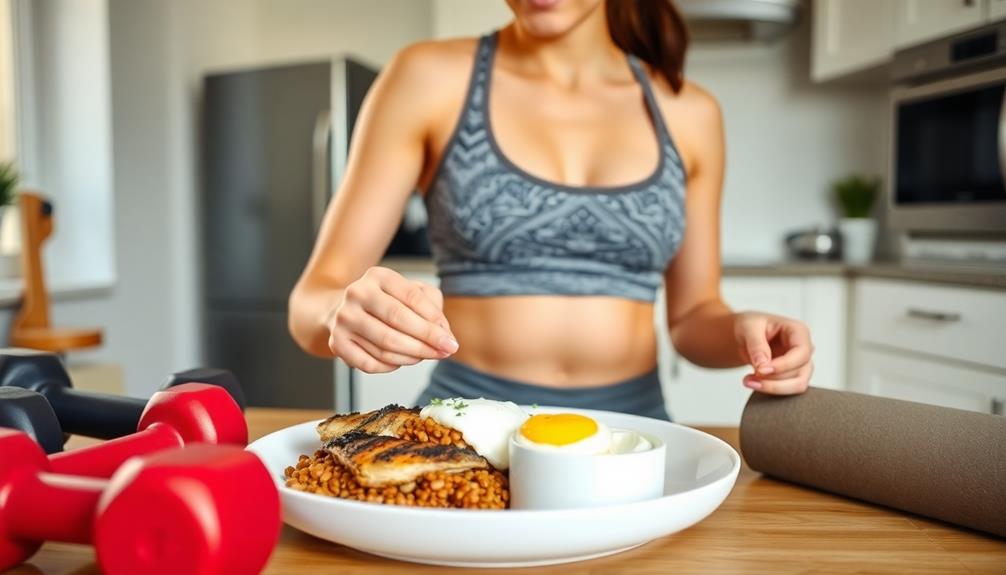
To reduce muscle soreness after exercise, eat more protein. Protein helps repair and recover muscles, which can lessen soreness. Aim for 1.6 to 2.2 grams of protein per kilogram of body weight each day. Spread out your protein intake by eating it at meals and snacks.
Good protein sources include lean meats, fish, eggs, dairy, beans, and tofu. Protein powders can also help you get enough protein, especially if you want to build muscle. Consider having a protein shake or smoothie right after your workout to start muscle recovery. Eating protein before bed can also support muscle repair while you sleep.
Consume Antioxidant-Rich Foods
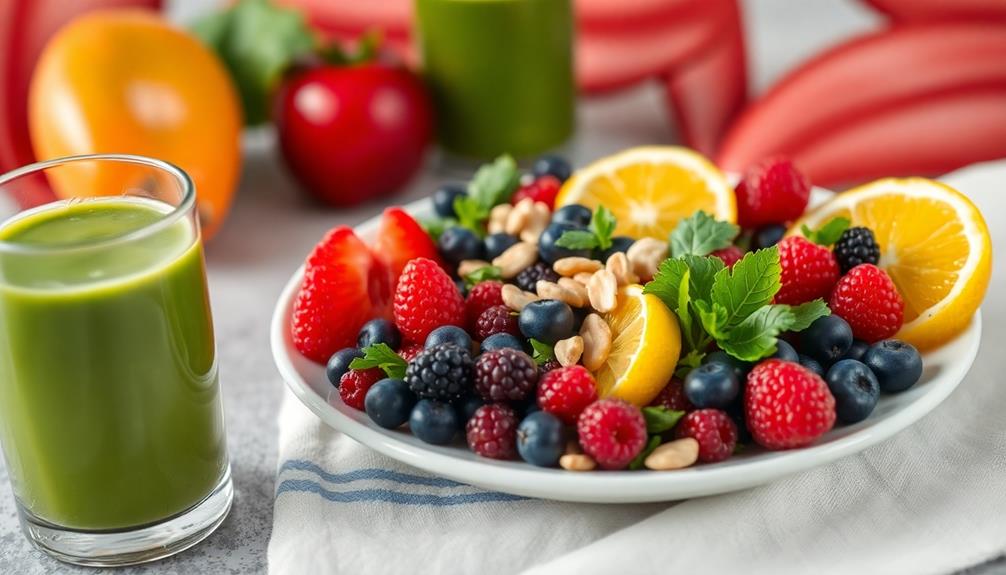
Eating foods rich in antioxidants can help with muscle soreness after a tough workout. Choose fruits and veggies with bright colors, like berries, cherries, and leafy greens. They're packed with nutrients that fight inflammation and stress in your body. Coconut water is great for staying hydrated and getting electrolytes, which also support recovery. Some brands even add extra vitamins.
Nuts, seeds, dark chocolate, and green tea are other tasty options for getting antioxidants. Try to mix up your choices throughout the day to get the most benefits. Making these foods a regular part of your diet can help your body recover faster and may even make soreness less intense.
Stay Hydrated
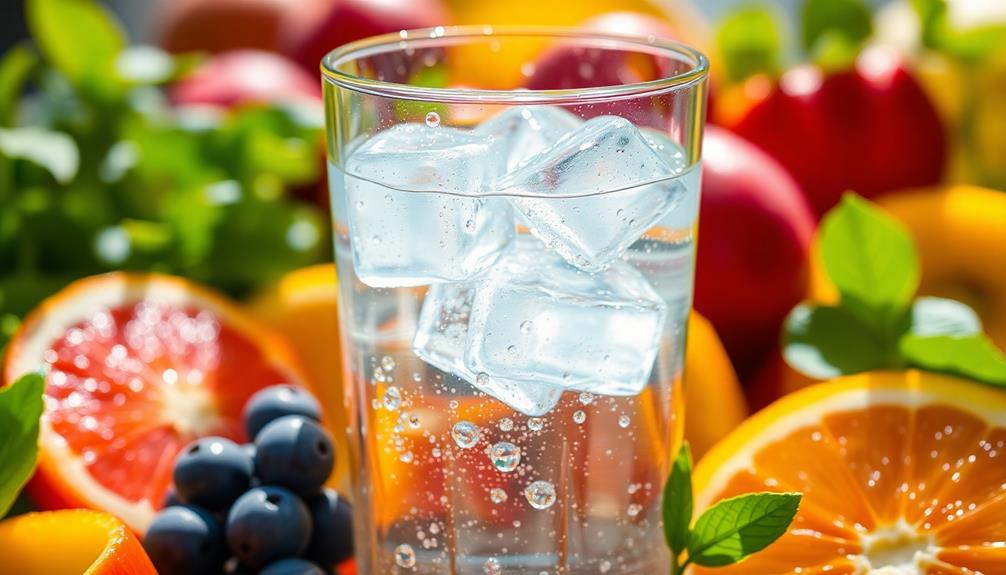
Staying hydrated is key to reducing muscle soreness and helping your muscles recover. When your body has enough water, it can more easily remove toxins and waste that make your muscles sore. Drink water regularly all day long, but especially before, during, and after working out. Coconut water is a great natural source of electrolytes and potassium, which can help your muscles recover and keep you hydrated. Choose coconut water with little to no added sugar and no preservatives for the most benefits.
Tips to stay hydrated and help your muscles recover:
- Drink at least 8-10 glasses of water every day
- Have drinks with electrolytes after tough workouts
- Eat fruits and veggies with high water content
- Check your pee color (light yellow means you're well hydrated)
- Go easy on the coffee and alcohol
Include Anti-Inflammatory Nutrients
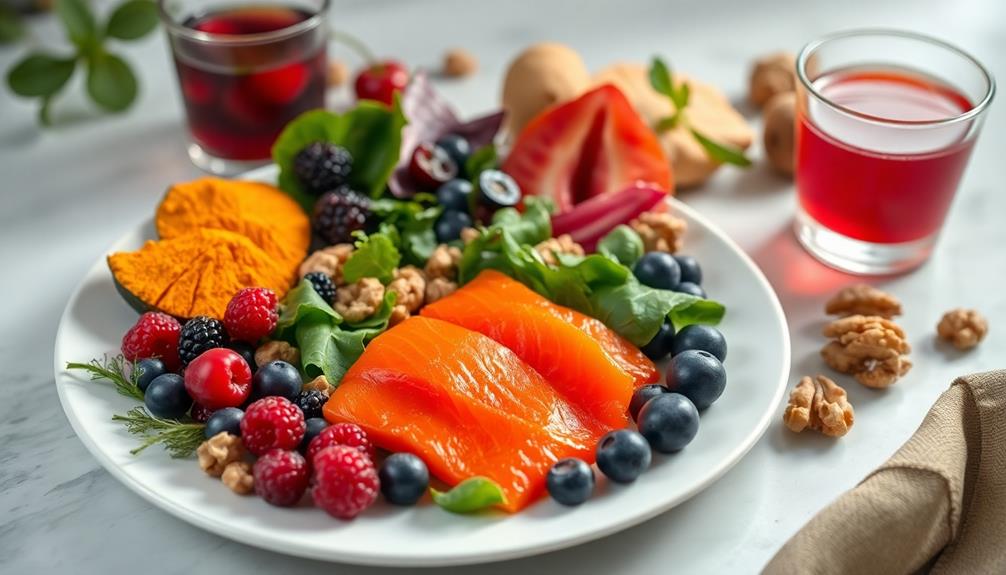
Eating foods that fight inflammation can help you bounce back faster after tough workouts. Go for options like salmon, sardines, and flaxseeds, which are packed with omega-3 fatty acids. These nutrients work to calm inflammation in your muscles. You can also try supplements designed to support recovery and reduce inflammation.
Make sure to load up on fruits and veggies high in antioxidants, too. Berries, leafy greens, and brightly colored vegetables have compounds that combat free radicals and oxidative stress. Spices like turmeric and ginger are also great for fighting inflammation. Try adding them to your meals or smoothies.
Tart cherry juice is another good choice. Studies show it can help ease muscle pain and inflammation. Don't forget about protein, either. Foods like lean meats, eggs, and legumes give your muscles the building blocks they need to repair and grow, which is key for recovering from soreness.
Opt for Complex Carbohydrates
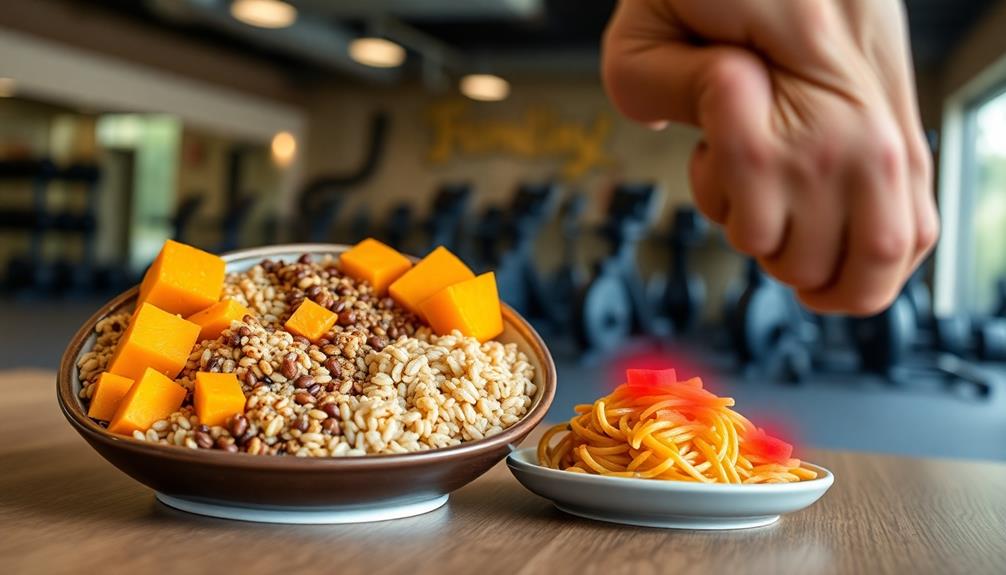
Complex carbs are great for managing muscle soreness and recovery after tough workouts. They give you steady energy and help refill your body's fuel tanks. These carbs also fight inflammation, which means less soreness. Pair them with protein, like plant-based options in some gluten-free protein powders, for even better results.
Try adding these complex carb foods to your post-workout plate:
- Whole grains like brown rice, quinoa, and oats
- Sweet potatoes
- Beans and lentils
- Whole grain pasta
- Fruits such as berries, apples, and bananas
Not only do these foods aid in recovery, but they also give you important nutrients and fiber. They keep you feeling full and support your overall well-being. Don't forget to balance complex carbs with lean proteins for the best recovery and a healthy diet.
Supplement With Omega-3 Fatty Acids
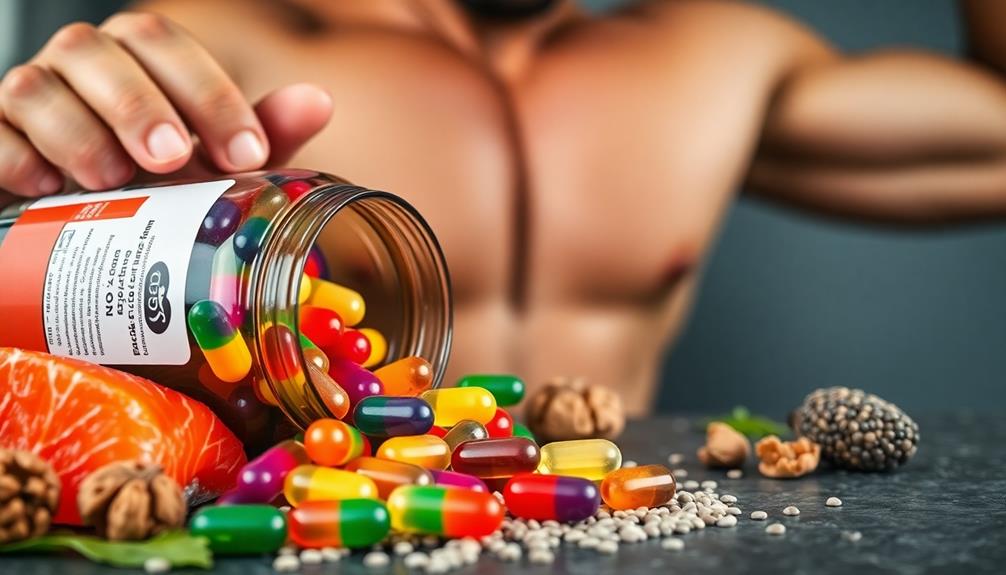
Omega-3 fatty acids help reduce muscle soreness and inflammation after tough workouts. You can get these healthy fats from fish, flaxseeds, and walnuts. If you don't eat enough of these foods, think about taking fish oil supplements. Depending on how active you are and your weight, aim for 1-3 grams of omega-3s per day.
Check out this quick list of foods high in omega-3s:
| Food | Omega-3s (g) |
|---|---|
| Salmon (3oz) | 1.8 |
| Chia seeds (1oz) | 5.1 |
| Walnuts (1oz) | 2.5 |
| Flaxseed oil (1tbsp) | 7.3 |
| Sardines (3oz) | 1.2 |
Time Your Nutrient Intake

Timing your nutrient intake is as important as what you eat for reducing muscle soreness. Here are some key points to keep in mind:
- Eat protein and carbs within 30 minutes after your workout
- Have a balanced meal 2-3 hours before exercising
- Drink water throughout the day, especially before and after training
- Choose foods with antioxidants for your pre-workout meal
- Eat a small, protein-rich snack before bed to help with overnight recovery
Adding Vitamin D3 supplements to your diet can also help your muscles recover and support your immune system. Try taking Vitamin D3 with dietary fats to help your body absorb it better.
Frequently Asked Questions
Can Massage or Stretching Help Reduce DOMS?
Yes, both massage and stretching can help reduce DOMS. You'll find that gentle massage increases blood flow, while stretching improves flexibility and reduces muscle tension. Try incorporating these techniques after your workouts for potential relief.
How Long Does DOMS Typically Last?
You'll typically experience DOMS for 24 to 72 hours after intense exercise. It usually peaks around 48 hours post-workout. However, the duration can vary depending on your fitness level and the intensity of your workout.
Are There Any Specific Exercises That Can Prevent DOMS?
While you can't completely prevent DOMS, you can reduce its severity. Try gradual progression in your workouts, focus on eccentric movements, and incorporate proper warm-ups and cool-downs. Regular exercise also helps your body adapt, lessening DOMS over time.
Does Age Affect the Severity or Duration of DOMS?
Yes, age can affect DOMS. As you get older, you're likely to experience more severe and longer-lasting muscle soreness. Your body's recovery processes slow down, making it harder to bounce back from intense workouts.
Can Over-The-Counter Pain Medications Help Alleviate DOMS Symptoms?
Yes, you can use over-the-counter pain medications to help alleviate DOMS symptoms. Nonsteroidal anti-inflammatory drugs (NSAIDs) like ibuprofen or naproxen can reduce pain and inflammation. However, don't rely on them long-term, as they may hinder muscle adaptation.

